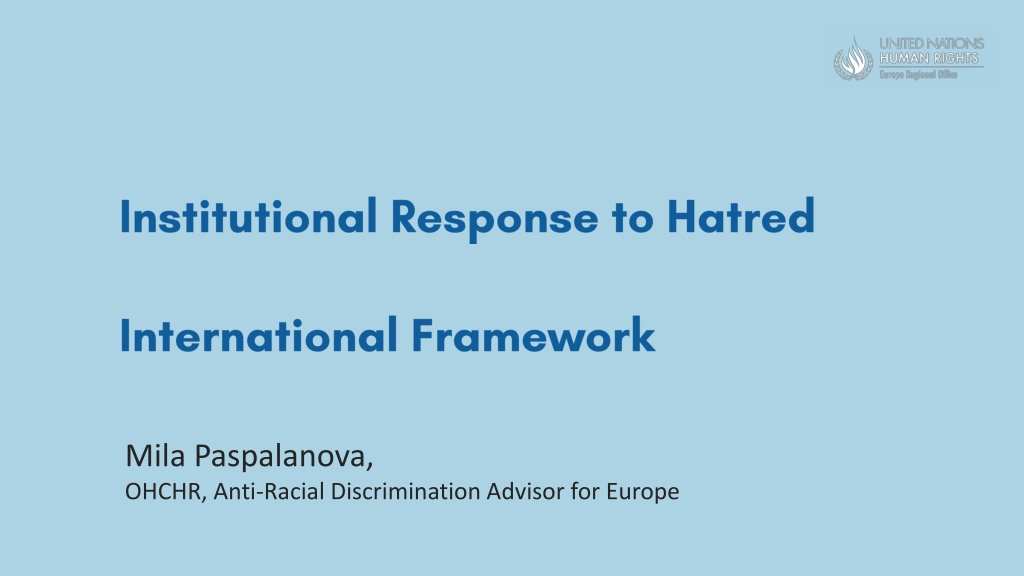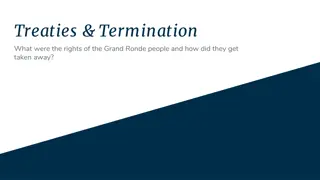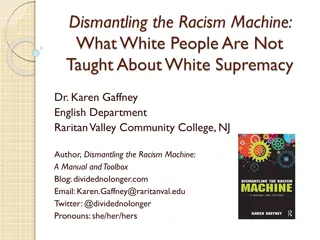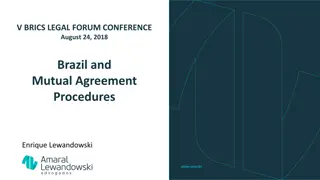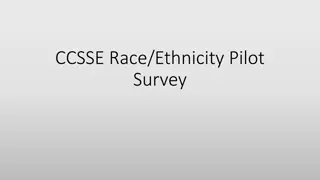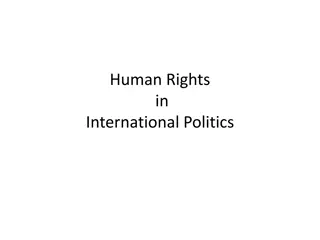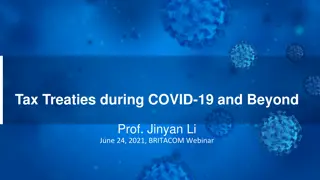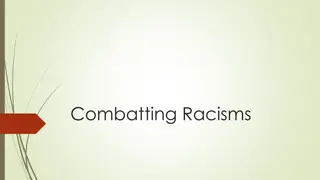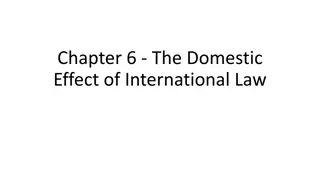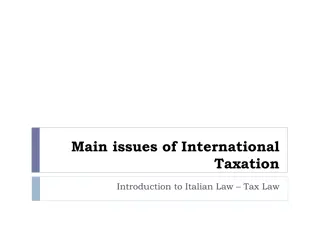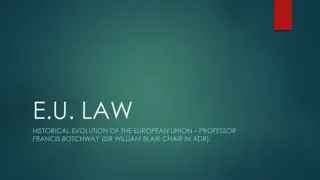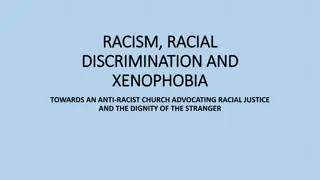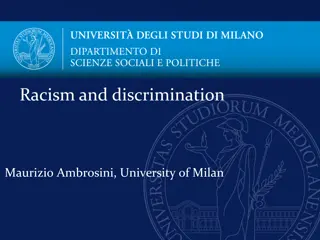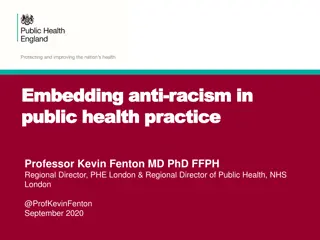International Human Rights Treaties and Recommendations for Combatting Racism
Mila Paspalanova, the Anti-Racial Discrimination Advisor for Europe at OHCHR, discusses core treaties related to racial discrimination, international conventions, and efforts to combat discrimination based on religion or belief. The content highlights the importance of ICERD, ICCPR, and other key treaties in promoting non-discrimination, transparency, and accountability. It also addresses the challenges of racism, hate speech, and discrimination faced by ethnic and religious minorities, particularly Muslims.
Download Presentation

Please find below an Image/Link to download the presentation.
The content on the website is provided AS IS for your information and personal use only. It may not be sold, licensed, or shared on other websites without obtaining consent from the author. Download presentation by click this link. If you encounter any issues during the download, it is possible that the publisher has removed the file from their server.
E N D
Presentation Transcript
Mila Paspalanova, OHCHR, Anti-Racial Discrimination Advisor for Europe
ICERD Inalienable Inalienable ESCAR ICCPR Art. 18 and 20 (freedom of religion) Indivisible Indivisible CPR 1981 UN Declaration on the Elimination of All Forms of Intolerance and of Discrimination Based on Religion or Belief Crosscutting principles: Interdependent Interdependent Participation Non-discrimination Transparency Accountability Universal Universal General Assembly Resolution 75/309 General Assembly Resolution 76/254 #Faith4Rights toolkit
Core Treaties 1. Forms of Racial Discrimination (21 Dec 1965) 2. ICCPR International Covenant on Civil and Political Rights (16 Dec 1966) 3. ICESCR International Covenant on Economic, Social and Cultural Rights (16 Dec 1966) 4. CEDAW Convention on the Elimination of All Forms of Discrimination against Women (18 Dec 1979) 5. CAT Convention against Torture and Other Cruel, Inhuman or Degrading Treatment or Punishment (10 Dec 1984) 6. CRC Convention on the Rights of the Child (20 Nov 1989) 7. ICMW International Convention on the Protection of the Rights of All Migrant Workers and Members of Their Families (18 Dec 1990) 8. CPED International Convention for the Protection of All Persons from Enforced Disappearance 9. CRPD Convention on the Rights of Persons with Disabilities (12 Dec 2006) International Convention on the Elimination of All ICERD Normatively binding Established a committee of experts to monitor implementation of the treaty provisions by its States parties. Apply without distinction of race, ethnicity, religion, sex, national origin to all people (20 Dec 2006)
Check ratification status here: https://indicators.ohchr.org/ + Special Procedures of the HRC: independent human rights experts with mandates to report and advise on human rights from a thematic or country-specific perspective. As of November 2023, there are 46 thematic and 14 country mandates.
Emitted by the treaty bodies after examining country reports under treaties. Consult here: Universal Human Rights Index https://www.ohchr.org/en/resources/databases
On RACISM: CERD: 2478 All Treaty Bodies: 3879 All TB, SP and UPR: 8685 1899 recommendations along 67 documents related to ethnic and religious minorities 44 specifically on Muslim: (134 of 7 mechanisms) (325 all including SP and UPR) Hate crime and hate speech. Incitement of hate Media depicturing Muslims Attacks on Mosques, funding to protect places of worship Use of Muslims on political discourse. Leading public figures perpetuate hate speech and shape negative images Counter terrorism discourse Segregation Exclusion in all areas of life Data Equal representation Police profiling Anti-Muslim racism
- HRBA to policy Assessment, design, implementation, ongoing adjustments, monitoring and evaluation framework through HR indicators: + participation + data sources (public, surveys, NSI, CSO, academic, International recommendations) + budget + mainstreaming of non-discrimination and fight against racism in all policy + transparency and accountability mechanisms + mandatory implementation + coherence between EU and National level policy
- Legislative harmonization - Awareness raising - Capacity building - Strengthening CSO - Monitoring situations and communication to TB and SP - Connecting cases to relevant mechanisms - Production of guidelines, General recommendations and comments - Establishment of monitoring mechanisms and HR indicators
Lack of participation and mechanisms for it, regarding: CCPR CCPR Ethnic minorities CEDAW CEDAW Public policy (all stages) CERD CERD Legislation CESCR CESCR Implementation of recommendations CMW CMW Drafting of reports People with disabilities CRPD CRPD All areas of concern/life/decision making
Defenders of/activists on Ethnic minorities Women PAD Roma Migrants Muslim Non-Nationals Children People with disabilities Lack of participation and mechanisms for it Threats, attacks, intimidation, harassment, hate speech, reprisals, neo-Nazi Involvement in monitoring Presenting complaints Funding Legal restrictions on HRD work (e.g. migrants assistance) Protection, investigation, redress, accountability, justice, convictions, impunity Hiding information (state) Politicians/mainstream media vilifying CCPR CCPR CEDAW CEDAW CERD CERD CESCR CESCR CMW CMW CRPD CRPD CAT CAT CRC CRC
UN Guidance Note on Protection and Promotion of Civic Space * Variety of voices * Options tailored to needs * Candid feedback Freedom of expression, association, assembly Right to participate * Better responses * Stronger buy-in Security of those who speak up * More sustainable peace * Better development outcomes * More resilient societies
Better Taking CS seriously as the key to building back better after COVID-19 Leveraging new technologies for increased participation and protecting CS online understanding trends and preventive actions
Develop or implement policies on: free and equal access to information (including language considerations) inclusive and effective participation. Regularly assess the effectiveness of participation channels. Use safe and user-friendly digital platforms. Reach out to diverse actors and especially to those left behind, including communities, grassroot and women s organizations. Explore venues for civil society to challenge restrictions on participation.
Identify those at risk. Put victims at the center by addressing urgent protection needs in consultation with families and representatives. Be aware and raise awareness of legislative institutional and policy contexts and groups at risk. Act quickly based on clear protection protocols and follow-up procedures. Assure informed consent, confidentiality and do no harm. Pay particular attention on intimidation and reprisal against civil society.
Openness and transparency in all aspects of decision-making, and accountability of public authorities. Empowerment and education: rightsholders equipped with knowledge and capacity. Equality to ensure inclusiveness and diversity. An enabling environment, including the safety of those who participate, and remedies if the right to participation is violated. Independent pluralistic media. Peaceful assemblies.
Universal Human Right Index: Search Engine OHCHR on Human Rights Defenders and Civic Space: Mechanisms and Resources OHCHR and racism Working Group of Experts on People of African Descent Special Rapporteur on racism Committee on the Elimination of Racial Discrimination (CERD) Ad Hoc Committee on the elaboration of complementary standards Intergovernmental Working Group on Durban Group of Independent Eminent Experts on Durban Expert Mechanism: Racial Justice and Equality in Law Enforcement Permanent Forum on People of African Descent
